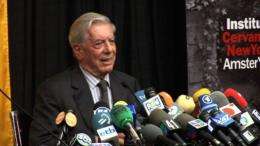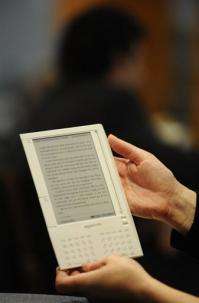Nobel laureate worries for literature in digital age

Peruvian novelist Mario Vargas Llosa, winner of this year's Nobel Prize for literature, likes books printed on paper and worries that something precious may be lost in an age of ebooks and digitization.
"My hope is that the new technology won't mean a banalization of the contents of the book," he said in New York Thursday.
The 74-year-old, a giant of Latin American literature who has combined a life of the imagination with engagement in the great political struggles of his time, was awarded the literature prize by the Swedish Academy which praised him as a "moral conscience."
At a news conference, Vargas Llosa said the announcement came as "a total surprise," and that he hoped to survive it with only a temporary disruption to his life.
"I will keep on writing until the last days of my life. I don't think the Nobel prize will change my writing, my style, my themes," he said.
From "The Time of the Hero," his debut novel in 1962, to more recent works like "The Feast of the Goat," Vargas Llosa has ranged widely from his native Peru to far off lands like dictator Rafael Leonidas Trujillo's Dominican Republic.
The Nobel committee honored Vargas Llosa for his body of work -- the historical novels, erotic romances, crime novellas, light-hearted comedies, plays, memoirs, and academic essays that he has written over the years.
The academy hailed "his cartography of structures of power and his trenchant images of the individual's resistance, revolt, and defeat."
Vargas Llosa also has plunged headlong into politics, running unsuccessfully for president of Peru, waging fiery debates first for and then against the Cuban revolution, and writing about wars and conflicts as a literary journalist.
But he acknowledged Thursday that the information revolution is rapidly changing his cherished world of words.
While he said change was inevitable, he added, "I don't know if I am happy. My idea of the book is (a) paper book."
He said he hoped literature would remain connected to the "most essential problems, social, human."
"I think there is a danger that the technology will impoverish the contents of the book," he said. "But this also depends on us: if we want literature to keep being what it has been, it is in our hands."
Vargas Llosa, who is teaching his philosophy of literature at Princeton University in New Jersey this semester, gave a vibrant defense of its continuing relevance.
"Reading has to be encouraged in the new generations, and young people especially have to be convinced that literature is not just knowledge, that literature is not just a way to acquire certain concepts or ideas, but is an extraordinary pleasure."

Good literature is "fundamental if we want to live in freedom in the future" because it creates citizens who are less easily manipulated by those in power.
"Nothing awakens the critical spirit in a society as much as good literature. That is why the first thing all dictatorial regimes do, not matter what their stripe, is impose censorship.
"They try to control what is the literary life because they see in the literary life the seeds of danger to power.
"And it's true: good literature, by awakening the critical spirit, creates citizens who are more difficult to manipulate than in a society without literature and without good books."
(c) 2010 AFP

















